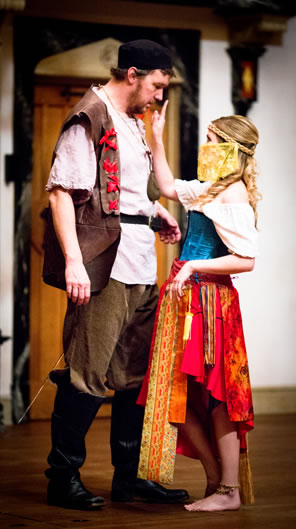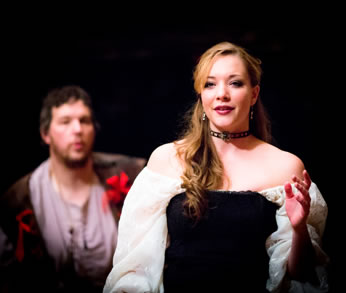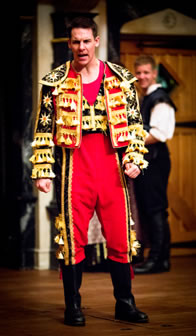The Rover
This Rover Explores Humanity's Landscape
By Aphra Behn
American Shakespeare Center, Blackfriars Playhouse, Staunton, Va.
Saturday, January 17, 2015, C–6&7 (center stalls)
Actor's Renaissance Season
Pop quiz—match the quotes below with these scripts: A) Aphra Behn's 1677 The Rover; B) Oscar Wilde's 1892 Lady Windermere's Fan; C) Woody Allen's 1979 Manhattan; D) Daniel Waters' 1988 Heathers; E) Judd Apatow's 2007 Knocked Up; F) Chris Rock's 2014 Top Five.
- "There's no sinner like a young saint."
- "You are not married, are you?” “All the honey of matrimony but none of the sting, friend."
- "Why, how the devil came you so drunk?” “Why, how the devil came you so sober?”
- "I must, like cheerful birds, sing in all groves.”
- “Marriage is as certain a bane to love as lending money is to friendship.”
- “I am of a nation that are of the opinion a woman's honor is not worth guarding when she has a mind to part with it.”

Willmore (John Harrell) is enthralled by the disguised Hellena (Lauren Ballard) in the American Shakespeare Center's Actors' Renaissance Season production of Aphra Behn's The Rover at the Blackfriars Playhosue. Photo by Lindsey Walters, American Shakespeare Center.
Stop trying. All six lines are in Behn's The Rover. Sorry to set you up with a trick question, but not sorry to point out the timeless wit as well as the wisdom of this play. Though the play's plot and characters are stuck in the Restoration Era in which it is written, Behn seems more of a 21st century writer in the way she presents the story's crux, and she paints her characters with such detailed individualism that they rate with William Shakespeare's among theater's great creations.
In particular, Willmore, the rover of the title and the man who zings off all the lines listed above (and many more such bombshell laughs), is a character who comes closest to Falstaff in his dimensions of rascality blended with an outsized charm you can't help adore. In Behn's play, Willmore is one of four English cavaliers roaming the streets of 17th century Spanish-controlled Naples during Carnival, but in any and all eras his single-minded pursuit of sex would be shocking in its blatant extremity. Yet, he is beloved of both sinners and saints. His carelessness with alcohol, money, and his sword lead to an unending series of catastrophes for his friends, yet he ultimately is held in high esteem and trust by every one of them.
One of those friends is Belvile (Nathan C. Crocker), the colonel of this cavalier contingent, whose pursuit of honorable love Willmore unwittingly thwarts at every turn. Willmore even attempts to rape Belvile's betrothed, Florinda, and though his excuse afterward is truthful enough—he had no idea this was the woman and meeting place in Belvile's plan—even that lays bare Willmore's simplistic logic: the garden gate was open and a young woman was waiting in the garden, ergo Willmore saw both as an open invitation for him.
How does Belvile not run Willmore through with both his and Willmore's swords? Heck, how is the whole garden escapade even funny? It's all in the way Behn wrote the part of Willmore and the way John Harrell plays him. I first saw The Rover in a 1986 Royal Shakespeare Company production with Jeremy Irons as Willmore, a performance as vivid in my mind's eye as if I were watching it now. I distinctly remember, as well, my take away from it: how could I admire so much someone so despicable? Harrell achieves the same conundrum: a nun-in-training and a prostitute fall head-over-heels in love with Willmore—and we could add Belvile to his list of admirers, too, even as he turns dizzy with frustration—despite the self-absorption that leads to his bawdy frankness and misguided exploits. Harrell could wink his way through the role and get plenty of laughs, but he gives Willmore such sincerity wrapped in an air of gullibility that he earns our love, too.
I've already provided plenty of good Willmore quotes at the top of this story, but get a load of this pickup line: “I am come from sea, child, and Venus not being propitious to me in her own element, I have a world of love in store. Would you would be good natured and take some on't off my hands.” Mind you, he says this to a young woman who, he is about to learn, is a postulant, but no matter; he then proclaims that "There's no sinner like a young saint" and offers to do good Christian charity by saving the young woman from being damned with everlasting redemption. Her reaction: Intrigue, so much so that she starts her own manipulative scheme to bed him on her terms. As she is disguised, Willmore doesn't know he's just entered into a courtship with a wealthy girl.
Not only has Behn written a pinnacle of a scoundrel, she has written a young woman to match, Hellena, played in this production by Lauren Ballard. This Rover would be Harrell's show except that Ballard, who provided several gemstone moments in ASC's 2014 Summer/Fall repertory, does a revelatory star turn as Hellena. In fact, she takes firm hold of the stage in the opening scene, when Hellena argues with her brother Don Pedro (René Thornton Jr.) over his unromantic stance regarding the matrimonial desires of their sister Florinda (Bridget Rue). Hellena has just come home from the nunnery, which did nothing to tap down the passionate inclinations nesting in her breast, and she bounds through the scene with a compelling mix of girlish romanticism and philosophical sophistication.
Not content with creating two great characters, Behn stretches for a triad with Willmore's other female antagonist, and that stretch goes to the opposite end of the female spectrum where lies Angellica Bianca, the most famous—and most expensive—courtesan in all of Naples. Just posting her portrait is enough to inspire men to pay a thousand crowns a month for her, and she gets customers from the top of society (Don Antonio, the Spanish viceroy's son played with sinister charm by Michael Amendola) to the bottom (Willmore). The latter doesn't have a thousand crowns, but no matter; he sweet talks her into providing “All the honey of matrimony but none of the sting,” and she slides into an uncontrollable love for Willmore quite against not only her professional creed but her very nature. When Willmore spurns her for the younger Hellena, Angellica finds herself on the edge of an emotional abyss.

Angellica (Sara Hymes) negotiates with Willmore (John Harrell) in the American Shakespeare Center's Actors' Renaissance Season production of Alpha Behn's The Rover at the Blackfriars Playhouse. Photo by Lindsey Walters, American Shakespeare Center
In Sara Hymes, this company has an actress of classic beauty, with a face and physique that make a thousand crowns for the mere opportunity of catching a glimpse of her seem a bargain. Hymes plays heartbreak well, too. However, to me, the character of Angellica has so many more dimensions to explore as she ranges from tragic heroine with an ardor that could scale a soprano's aria to sassy soap opera diva. "Well, sir, since I am not fit to be beloved, I am resolved to think on some revenge on him that shamed me thus. Oh Willmore, Willmore!" she says, a line that brings to light all the broiling passions burning in her breast. She pulls a pistol on Willmore at the end, and we have to believe that she will squeeze the trigger either out of self-loathing, spite, or revenge, all wrapped in a tangled bow of despair. The only one who doesn't believe she will squeeze that trigger is Willmore. "Dost not thy guilty blood run shivering through thy veins?" she demands of him. "Faith, no child," he replies. "My blood keeps its old ebbs and flows still, and that usual heat too, that could oblige thee with a kindness, had I but opportunity." Even when a woman is pointing a firearm at his heart, Willmore lays down a pickup line: let's face it, he puts the cavalier in the cavalier, and as her anger grows, he wonders in an aside if she might actually be in earnest. Duh!
It's always dangerous to look for autobiography in a playwright's works (the best playwrights, like Shakespeare, are observers of the world, not necessarily participants), but you can't help wondering if Behn sees herself in Angellica; or perhaps in Hellena. Or maybe in both and in Florinda, too. She is yet another woman in this play full of lively wit, but every time her schemes go awry she ends up in danger of being raped. These scenes are written as comical, but some 1677 feminist subterfuge also seems at play when these scenes are juxtaposed with the story arcs of Angellica, who leads with her heart, no matter how small it seems at first, instead of her head; and Helena, who leads with her head instead of her heart, no matter how big it seems at first. Between these two is the practical-minded and steady-hearted Florinda who gets foiled by stupid, big-hearted men. Another timeless quality of this play is Behn's frank portrait of the plight of women whose only path to prosperity is through their sexuality, either as prostitutes or wives. Real wit wins Willmore, and my women readers will have to pass judgment on the merits of that reward.

Blunt (Patrick Midgley) emerges with his Spanish-tailored suit in The Rover at the Blackfriars Playhouse. Photo by Lindsey Walters, American Shakespeare Center.
This play has two other key female characters: Moretta, Angellica's waiting woman who rails at her mistress for giving in to Willmore, and Lucetta, another whore who swindles her clients. Both are played in this production by Chris Johnston, who takes his cross-gender-casting duties seriously and presents an earnest foil in the former and a comic scammer in the latter.
Lucetta's victim is one of the four cavaliers, Blunt, an English country gull played by Patrick Midgley in a performance that would steal the show if Behn herself hadn't weighted the proceedings in favor of Willmore and the women. "'Adsheartlikins," he exclaims often and hilariously, a Leave It to Beaver–like epithet Blunt applies to everything from seeing a beautiful woman to seeking revenge on all women to fearing ridicule from his fellow cavaliers. Midgely swirls sweetness and naiveté into a current of bravado as he jumps through a series of acting hoops of fire in his presentation of Blunt. He looks upon Johnston's Lucetta enraptured in the belief that she is a paragon of virtue and true-hearted love though we and everybody else on stage knows she is trouble when she walks in. He strips down to his rubber ducky boxer shorts for his tryst with Lucetta before being cast head first into a pit by her henchmen. At the end, his Spanish-influenced Neapolitan tailor has outfitted him in a bull-fighter's costume. And adsheartlikins! it's the same costume—the pants a few sizes too large for Midgley—that Rick Blunt wore as Don Armado in the ASC touring production of Shakespeare's Love's Labour's Lost. The Blunt as Blunt insider joke gets further salt when Midgley speaks his Blunt's line, "Methinks I look like a bouquet garni stuffed full of fool's flesh." Midgley played the King of Navarre in that Love's Labour's Lost alongside the much-loved, clown-casted Rick Blunt, and I suspect that when Midgley chose the costume for his Blunt's final moment of embarrassment he did so with affection.
One thing we've not addressed yet here is that this production of The Rover is part of the ASC's annual Actors' Renaissance Season in which the 12-actor troupe puts on a repertory of five plays with about a week's worth of rehearsal time for each production, using no director and no design team. They do all the blocking themselves and scavenge their costumes from the ASC's collection or their own closets. And they work out the characters themselves.
That's a tall order Behn has given them, and a deep one, too. With The Rover, she also has given audiences, through time, some timely fun.
Eric Minton
January 27, 2015
Comment: e-mail editorial@shakespeareances.com
Start a discussion in the Bardroom



 Find additional Shakespeareances
Find additional Shakespeareances